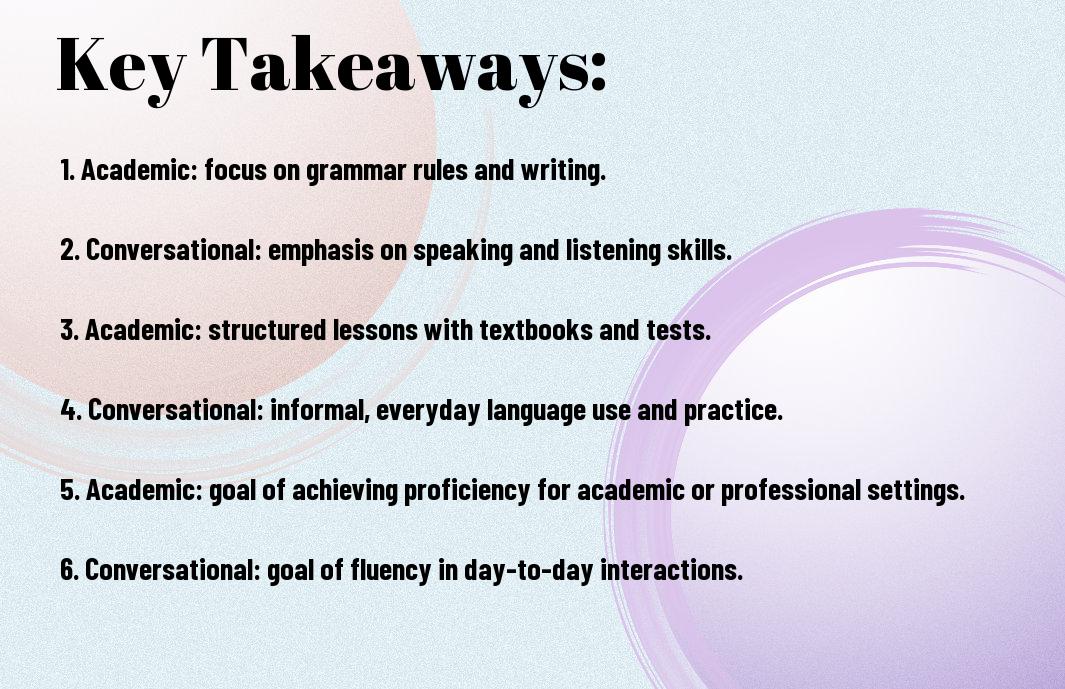You may be launching on a language learning journey, but do you know the distinctions between studying a language for everyday conversations versus academic pursuits? Understanding these variations can significantly impact your learning approach and goals. In this insightful exploration, we research into the nuances of learning a language for conversational fluency as opposed to academic rigor, offering you valuable insights to shape your language learning experience.
Key Takeaways:
- Focus on practical vocabulary: When learning a language for conversational purposes, the focus is on everyday vocabulary and expressions that will help in communicating effectively in social situations.
- Emphasis on grammar and formal structure: Learning a language for academic purposes involves a deeper investigate grammar rules, sentence structure, and formal language usage to convey complex ideas and concepts.
- Interaction and fluency: Conversational language learning prioritizes speaking and listening skills to improve fluency and communication skills, while academic language learning may entail reading and writing skills for academic purposes such as research or essays.


Defining Language Learning Goals
Conversational Purposes: Social Interaction and Travel
With conversational language learning goals, your primary focus is on developing the ability to communicate effectively in everyday situations. This means being able to engage in small talk, make new friends, and navigate social interactions with ease when traveling to different countries. Your aim is to pick up the language skills necessary to comfortably order food at a local cafe, ask for directions, or strike up a conversation with locals.
Academic Purposes: Research, Study, and Career Advancement
One of the key differences in setting language learning goals for academic purposes is the emphasis on comprehension, writing, and reading skills rather than solely on speaking abilities. When learning a language for academic reasons, your goal might be to understand scholarly articles, conduct research in a foreign language, or even pursue a degree in a bilingual program. You’re likely to focus on grammar rules, vocabulary expansion, and the ability to express complex ideas in writing.
Career advancement can also be a driving force behind academic language learning goals. Whether you’re aiming to work for an international organization, conduct business in a foreign market, or collaborate with colleagues from different linguistic backgrounds, mastering a language for professional purposes can open up a world of opportunities for you.

Language Acquisition Strategies
Now, when it comes to learning a language for conversational purposes versus academic purposes, the strategies you employ can make a significant difference in your proficiency. If you’re curious about the distinctions between conversational and academic English, you can dive deeper into it by reading more on How is academic English different from conversational English.
Immersion and Interaction for Conversational Fluency
Conversational language acquisition often relies heavily on immersion and regular interaction. By surrounding yourself with native speakers or immersing yourself in the language through movies, music, and daily conversations, you naturally pick up the rhythm, nuances, and colloquial expressions that make casual conversations flow more naturally. Interacting with others in the language helps you practice listening, speaking, and understanding in real-time, enabling you to adapt and respond fluidly in various situations.
Analytical and Critical Thinking for Academic Excellence
With academic language learning, the focus shifts towards analytical and critical thinking skills. In an academic setting, you need to investigate deeper into the structure of the language, understand complex grammar rules, and analyze texts with a critical eye to extract and present information effectively. This involves not only mastering the vocabulary but also honing your skills in reasoning, comprehension, and argumentation to excel in academic discussions, debates, and writing assignments.
With academic language learning, you are encouraged to question, evaluate, and express your thoughts with precision and clarity. This analytical approach helps you grasp the intricate details of the language, enabling you to engage with academic material in a more profound and meaningful way.
Language Skills Focus
Your understanding of language skills can greatly differ depending on your ultimate goals. If you want to probe deeper into the nuances of Social vs Academic English, you can check out Social vs Academic English: What is the difference? Part 1 for an in-depth analysis.
Conversational Purposes: Emphasis on Speaking and Listening
Skills focused on conversational purposes in language learning predominantly revolve around honing your speaking and listening abilities. The primary goal is to facilitate effective communication in real-life scenarios, such as everyday conversations, social interactions, and informal settings.
Academic Purposes: Emphasis on Reading and Writing
When pursuing language learning for academic purposes, the emphasis shifts towards refining your reading and writing proficiencies. This approach is crucial for comprehending complex texts, conducting research, writing essays, and engaging in academic discourse.
Emphasis: Academic language learners often strive to enhance their reading comprehension skills to tackle scholarly articles, textbooks, and other academic materials. Furthermore, polished writing skills are vital for academic success, enabling you to articulate your thoughts effectively through essays, reports, and research papers.
Language Learning Materials and Resources
Conversational Purposes: Authentic Materials and Real-Life Contexts
Resources for learning a language for conversational purposes often focus on authentic materials and real-life contexts. This includes listening to native speakers through podcasts, watching movies or TV shows in the target language, and engaging in conversations with language partners. These resources provide you with exposure to natural language usage and help you develop a sense of the rhythm and flow of the language.
Academic Purposes: Scholarly Articles, Textbooks, and Research Papers
Contexts that involve learning a language for academic purposes typically revolve around scholarly articles, textbooks, and research papers. These materials are more structured and formal, emphasizing grammar rules, vocabulary building, and complex sentence structures. When learning a language for academic reasons, you may find yourself delving into the intricacies of language and focusing on writing essays or conducting research in the target language.
For instance, when studying a language like French for academic purposes, you may explore French literature, dissect grammar rules, and analyze the nuances of the language through academic texts. These resources provide you with a deeper understanding of the language’s structure and usage, preparing you for academic pursuits such as writing analytical essays or engaging in scholarly discussions.
Time Commitment and Study Schedules
Conversational Purposes: Flexible and Spontaneous Learning
After deciding to learn a language for conversational purposes, you’ll find that your approach to studying can be more flexible and spontaneous. Conversational learning allows you to focus on practical speaking skills, which means you can tailor your study sessions to fit your daily routine. This flexibility enables you to practice the language whenever you have a spare moment, whether it’s during your commute, while cooking, or before bed.
Academic Purposes: Structured and Rigorous Study Plans
Purposes When learning a language for academic purposes, your study schedule tends to be more structured and rigorous. Academic language learning typically involves following a syllabus, completing assignments, and preparing for exams. This structured approach requires dedicated study sessions and adherence to a prescribed curriculum to ensure comprehensive coverage of the language’s grammar, vocabulary, and cultural nuances.
Plus, academic language learning often involves setting specific goals and timelines to track your progress and proficiency levels. This methodical approach helps you stay on track and monitor your advancement in the language systematically.
Language Learning Environments
Unlike other subjects, learning a language involves immersing yourself in various environments to practice and improve your skills. Whether you’re learning for conversational or academic purposes, the environments you engage in play a crucial role in your language development.
Conversational Purposes: Language Exchange Partners and Informal Settings
Informal settings are key for language learners focused on conversational purposes. Engaging with language exchange partners or practicing with native speakers in a casual setting allows you to pick up on colloquial expressions, slang, and cultural nuances that are imperative for fluid conversations. Coffee shops, language exchange meet-ups, and online language forums are great platforms for such interactions. These environments offer a relaxed atmosphere for you to practice speaking and listening, helping you become more comfortable and confident in real-life conversations.
Academic Purposes: Classroom Instruction and Formal Education
For those learning a language for academic purposes, classroom instruction and formal education settings are vital. Enrolling in language courses at educational institutions or attending structured language classes provide a systematic approach to learning grammar rules, vocabulary, and academic writing skills. These environments offer a more structured curriculum with assessments and evaluations to track your progress. Additionally, interacting with classmates and instructors in a formal setting can help you deepen your understanding of the language’s complexities and academic applications.
Formal education environments often focus on building a strong foundation in the language, emphasizing reading comprehension, writing proficiency, and grammatical accuracy. These settings are well-suited for individuals looking to pursue higher levels of language proficiency for academic or professional reasons.
Conclusion
With these considerations in mind, it is important to recognize the distinct differences between learning a language for conversational purposes versus academic purposes. When learning a language for conversation, your focus is on practical communication skills, such as everyday vocabulary and common phrases. On the other hand, academic language learning may require a deeper understanding of grammar rules, complex vocabulary, and writing conventions.
Ultimately, whether you are learning a language for everyday conversations or academic pursuits, both approaches have their unique benefits and challenges. By understanding your purpose for learning a language, you can tailor your studies to best suit your needs and goals. Embrace the journey of language learning, and remember that each new word or phrase you master brings you one step closer to fluency.
Q: What are the differences between learning a language for conversational purposes versus academic purposes?
A: When learning a language for conversational purposes, the focus is on practical communication skills such as speaking and listening, while academic language learning emphasizes reading and writing skills, grammar rules, and vocabulary building.
Q: How does the approach differ when learning a language for conversational purposes versus academic purposes?
A: Conversational language learning often involves immersion through speaking with native speakers, practicing real-life scenarios, and focusing on everyday language usage. Academic language learning typically follows a structured curriculum, utilizes textbooks, and involves assessments such as exams and essays to measure proficiency.
Q: What are the benefits of learning a language for conversational purposes versus academic purposes?
A: Learning a language for conversational purposes can help build confidence in speaking and understanding the language in real-life situations, while learning for academic purposes can provide a deeper understanding of grammar rules, vocabulary nuances, and literary texts in that language.


